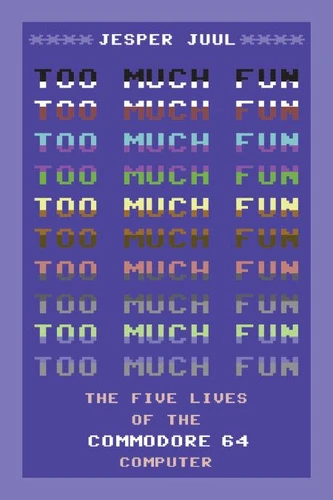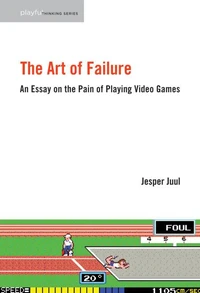Too Much Fun. The Five Lives of the Commodore 64 Computer
Par :Formats :
Disponible dans votre compte client Decitre ou Furet du Nord dès validation de votre commande. Le format ePub protégé est :
- Compatible avec une lecture sur My Vivlio (smartphone, tablette, ordinateur)
- Compatible avec une lecture sur liseuses Vivlio
- Pour les liseuses autres que Vivlio, vous devez utiliser le logiciel Adobe Digital Edition. Non compatible avec la lecture sur les liseuses Kindle, Remarkable et Sony
- Non compatible avec un achat hors France métropolitaine
 , qui est-ce ?
, qui est-ce ?Notre partenaire de plateforme de lecture numérique où vous retrouverez l'ensemble de vos ebooks gratuitement
Pour en savoir plus sur nos ebooks, consultez notre aide en ligne ici
- Nombre de pages244
- FormatePub
- ISBN978-0-262-38056-0
- EAN9780262380560
- Date de parution10/12/2024
- Protection num.Adobe DRM
- Taille6 Mo
- Infos supplémentairesepub
- ÉditeurThe MIT Press
Résumé
The surprising history of the Commodore 64, the best-selling home computer of the 1980s-the machine that taught the world that computing should be fun. The Commodore 64 (C64) is officially the best-selling desktop computer model of all time, according to The Guinness Book of World Records. It was also, from 1985 to 1993, the platform for which most video games were made. But while it sold at least twice as many units as other home computers of its time, like the Apple II, ZX Spectrum, or Commodore Amiga, it is strangely forgotten in many computer histories.
In Too Much Fun, Jesper Juul argues that the C64 was so popular because it was so versatile, a machine developers and users would reinvent again and again over the course of 40 years. First it was a serious computer, next a game computer, then a computer for technical brilliance (graphical demos using the machine in seemingly impossible ways), then a struggling competitor, and finally a retro device whose limitations are now charming.
The C64, Juul shows, has been ignored by history because it was too much fun. Richly illustrated in full color, this book is the first in-depth examination of the C64's design and history, and the first to integrate US and European histories. With interviews of Commodore engineers and with its insightful look at C64 games, music, and software, from Summer Games to International Karate to Simons' BASIC, Too Much Fun will appeal to those who used a Commodore 64, those interested in the history of computing and video games and computational literacy, or just those who wish their technological devices would last longer.
In Too Much Fun, Jesper Juul argues that the C64 was so popular because it was so versatile, a machine developers and users would reinvent again and again over the course of 40 years. First it was a serious computer, next a game computer, then a computer for technical brilliance (graphical demos using the machine in seemingly impossible ways), then a struggling competitor, and finally a retro device whose limitations are now charming.
The C64, Juul shows, has been ignored by history because it was too much fun. Richly illustrated in full color, this book is the first in-depth examination of the C64's design and history, and the first to integrate US and European histories. With interviews of Commodore engineers and with its insightful look at C64 games, music, and software, from Summer Games to International Karate to Simons' BASIC, Too Much Fun will appeal to those who used a Commodore 64, those interested in the history of computing and video games and computational literacy, or just those who wish their technological devices would last longer.
The surprising history of the Commodore 64, the best-selling home computer of the 1980s-the machine that taught the world that computing should be fun. The Commodore 64 (C64) is officially the best-selling desktop computer model of all time, according to The Guinness Book of World Records. It was also, from 1985 to 1993, the platform for which most video games were made. But while it sold at least twice as many units as other home computers of its time, like the Apple II, ZX Spectrum, or Commodore Amiga, it is strangely forgotten in many computer histories.
In Too Much Fun, Jesper Juul argues that the C64 was so popular because it was so versatile, a machine developers and users would reinvent again and again over the course of 40 years. First it was a serious computer, next a game computer, then a computer for technical brilliance (graphical demos using the machine in seemingly impossible ways), then a struggling competitor, and finally a retro device whose limitations are now charming.
The C64, Juul shows, has been ignored by history because it was too much fun. Richly illustrated in full color, this book is the first in-depth examination of the C64's design and history, and the first to integrate US and European histories. With interviews of Commodore engineers and with its insightful look at C64 games, music, and software, from Summer Games to International Karate to Simons' BASIC, Too Much Fun will appeal to those who used a Commodore 64, those interested in the history of computing and video games and computational literacy, or just those who wish their technological devices would last longer.
In Too Much Fun, Jesper Juul argues that the C64 was so popular because it was so versatile, a machine developers and users would reinvent again and again over the course of 40 years. First it was a serious computer, next a game computer, then a computer for technical brilliance (graphical demos using the machine in seemingly impossible ways), then a struggling competitor, and finally a retro device whose limitations are now charming.
The C64, Juul shows, has been ignored by history because it was too much fun. Richly illustrated in full color, this book is the first in-depth examination of the C64's design and history, and the first to integrate US and European histories. With interviews of Commodore engineers and with its insightful look at C64 games, music, and software, from Summer Games to International Karate to Simons' BASIC, Too Much Fun will appeal to those who used a Commodore 64, those interested in the history of computing and video games and computational literacy, or just those who wish their technological devices would last longer.




















